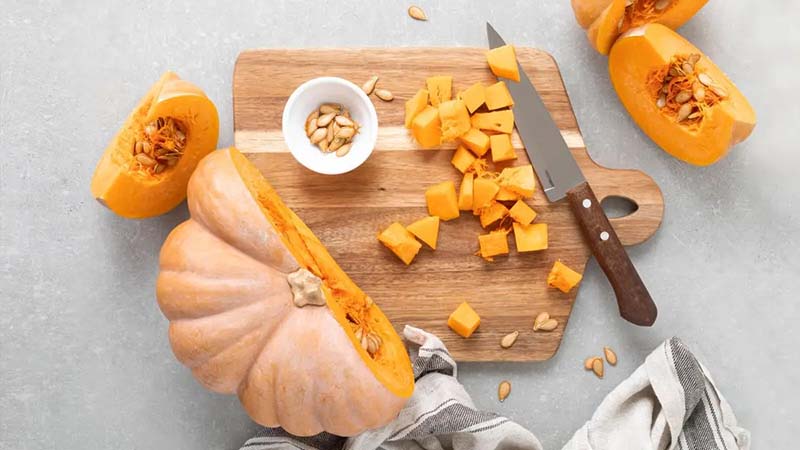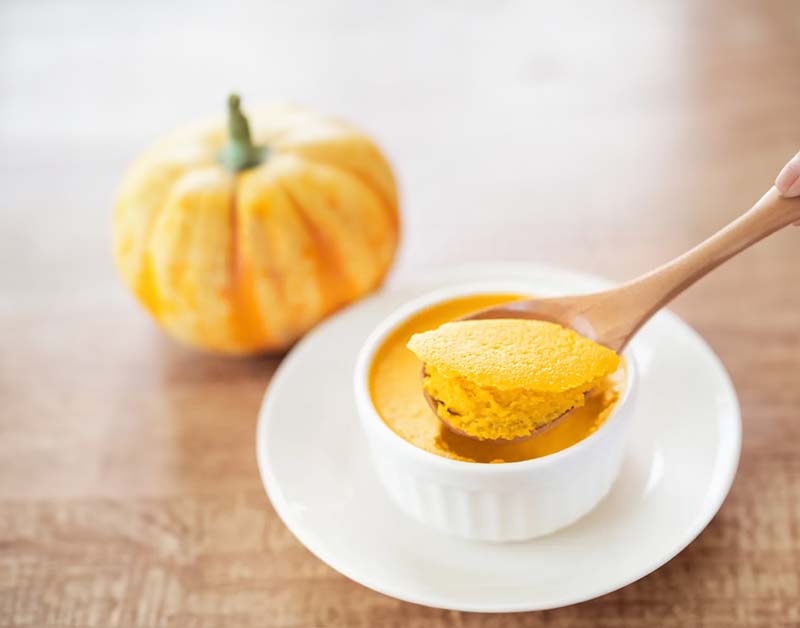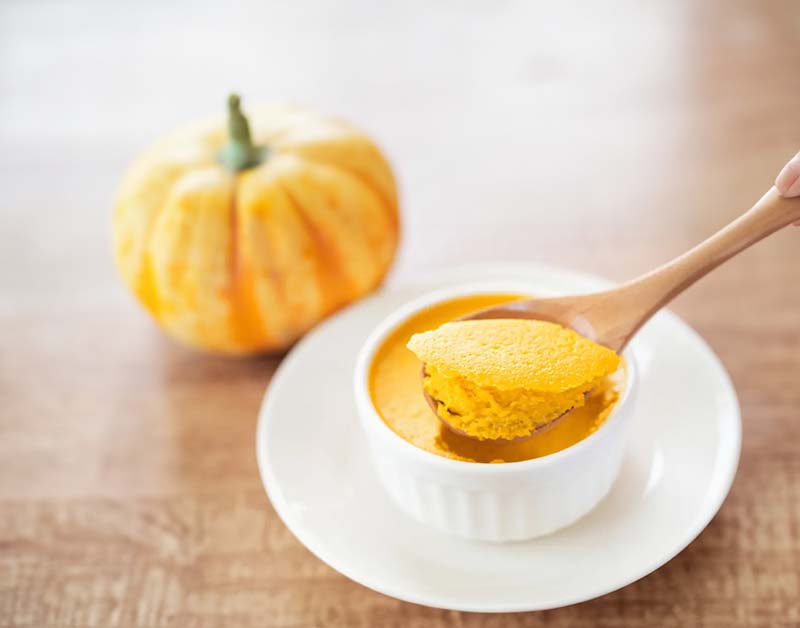Pumpkins are more than just for Halloween and pumpkin spice lattes. This article looks at a big question: “Is Pumpkin Good for Weight Loss?” We talk about how these orange fruits are not just for fun and sweets.
Even though pumpkins are often used in sweet foods, they are actually good for healthy eating. This shows that pumpkins are both a fun part of fall and good for your health, especially in terms of weight management.
Related articles
- Are Cucumbers Good for Weight Loss? Unveiling the Truth.
- Is Squash Good for Weight Loss? Unveiling the Wonders.
- Is Lettuce Good for Weight Loss? The Surprising Diet Ally.
1. Is Pumpkin Good for Losing Weight?
Pumpkin is a great pick for anyone trying to lose weight. It’s really low in calories but packed with good stuff for your body. Most of a pumpkin is water – about 94% – and a cup of it has less than 50 calories. This makes it a much better choice than many other foods high in carbs when you’re counting calories. Plus, it’s full of fiber, which helps you feel full and can be key in managing your weight.
But that’s not all. Pumpkins are loaded with vitamins, minerals, and antioxidants, which are great for your immune system, keeping your eyes healthy, lowering the chance of some cancers, and helping your heart and skin. They also have a lot of potassium, which is super important if you work out as part of your weight-loss plan because it helps your muscles recover. And there’s something called tryptophan in pumpkin. This isn’t just good for your mood, but it also helps you handle stress, and staying stress-free is important when you’re trying to keep a healthy weight.
Quick tip: Adding pumpkin to what you eat is easy and tasty. You can blend it into smoothies, stir it into soups, or roast it as a side dish. Pumpkin is flexible for cooking, so you can use it in lots of different meals, making it easier to stick to your weight loss plan without missing out on great flavors.

2. Nutritional Value of Pumpkin
Pumpkin is a nutritious vegetable, and a 100-gram serving offers a variety of essential nutrients. It is primarily made up of water, at 91.6 grams, making it hydrating and low in calories. In this serving size, there are only 26 calories, which is great for anyone watching their calorie intake.
In terms of protein, pumpkin provides 1 gram per 100 grams, contributing to your daily protein needs. Its fiber content, at 0.5 grams, is beneficial for digestive health and helps you feel full, aiding in weight management.
Pumpkin is also a source of calcium, with 21 milligrams per 100 grams. Calcium is key for strong bones and teeth. Moreover, it contains 9 milligrams of Vitamin C, which is vital for a healthy immune system and skin. Lastly, with 12 milligrams of magnesium, pumpkin supports muscle and nerve function and helps maintain healthy blood pressure levels.
In summary, pumpkin is a nutrient-rich food that offers a range of benefits, including hydration, low-calorie content, and essential vitamins and minerals. It’s an excellent addition to a healthy, balanced diet.
3. How Is Pumpkin Good for Weight Loss?
Pumpkin is excellent for weight loss for several reasons:
Low Calorie Content
Pumpkin is a food rich in nutrients but low in calories. Containing about 94% water, a cup of pumpkin (about 245 grams) has less than 50 calories. This makes it a great choice for weight loss because you can eat more of it compared to other high-carb foods without consuming a lot of calories.
High Fiber Levels
Despite having only 0.5 grams of fiber per 100 grams, a cup of pumpkin still provides around 3 grams of fiber and only 49 calories. Fiber is crucial for digestive health, which is a key part of weight loss. It also helps you feel fuller for longer, reducing the urge to snack on less healthy options.
A Nutrient-dense Vegetable
Pumpkin is low in calories but high in essential nutrients. It’s packed with vitamins A, C, and E, and minerals like potassium, all of which are important for overall health and can aid in weight loss efforts.
Abundant in Water
With its high water content, pumpkin helps in feeling full and staying hydrated. This is beneficial for weight management as sometimes thirst can be mistaken for hunger. Additionally, the fiber in pumpkin absorbs water, which slows down digestion and helps control appetite.
Rich in Antioxidants
Pumpkin contains antioxidants like beta-carotene (which gives it its orange color), vitamin C, and E. These antioxidants help neutralize free radicals in the body, reducing oxidative stress which is linked to chronic diseases and aging.
Low Glycemic Index
Pumpkin has a low glycemic index (3-75), meaning it releases glucose slowly into the bloodstream. This helps maintain stable blood sugar levels, preventing the rapid spikes and crashes that can lead to increased hunger and cravings.

4. Others Health Benefits of Pumpkin
Pumpkin offers a multitude of health benefits beyond aiding weight loss, thanks to its rich array of nutrients, including essential vitamins, minerals, fiber, and antioxidants:
Exceptionally Nutrient-Rich with a High Vitamin A Content
Pumpkin is loaded with beta-carotene, which the body converts into vitamin A. This vitamin is crucial for eye health, including the proper functioning of the retina and cornea. Vitamin A also supports healthy skin, bones, lungs, and kidneys. It’s better to get beta-carotene and vitamin A from food sources like pumpkin rather than supplements.
Contributes to the Management of Chronic Diseases
Pumpkins contain antioxidants like alpha-carotene, beta-carotene, and beta-cryptoxanthin, which neutralize free radicals, thereby reducing oxidative stress linked to chronic diseases such as heart disease and cancer. These antioxidants have also shown potential in protecting against skin damage from the sun and reducing the risk of various conditions, though more research is needed for concrete health recommendations.

Contains Vitamins that Support Immune Function
The vitamin C and beta carotene in pumpkin strengthen the immune system. Pumpkin seeds also have immunomodulatory effects, which can enhance immune defense against infectious diseases. In some places, like India, pumpkin seeds are used in energy bars designed to boost immunity, particularly for athletes.
Remarkably Versatile and Simple to Incorporate into Your Diet
Pumpkin is a versatile and delicious ingredient that can be used in both sweet and savory dishes like custards, pies, pancakes, roasted vegetables, soups, and pastas. Its seeds are nutritious and can be eaten for additional health benefits. Canned pumpkin is a convenient option, but it’s important to check for added ingredients, especially sugar.

Antioxidants Present May Reduce the Risk of Cancer
Pumpkins are high in carotenoids, which act as antioxidants and may protect against certain cancers. Studies have shown that higher intakes of alpha-carotene and beta-carotene are linked to reduced risks of stomach and other cancers, though the exact cause of this reduction is still being studied.
Supports Heart Health
The potassium, vitamin C, and fiber in pumpkin are beneficial for heart health. Higher potassium intake is associated with lower blood pressure and reduced stroke risk. Additionally, the antioxidants in pumpkin may prevent the oxidation of LDL cholesterol, a risk factor for heart disease.

Enhances Skin Health
Pumpkin’s high content of carotenoids, vitamin A, and vitamin C makes it great for skin health. These nutrients act as natural sunblocks and help maintain strong, healthy skin. Carotenoids, lutein, zeaxanthin, and vitamin E in pumpkin also protect the skin from UV damage.

Promotes Healthy Eyesight
Nutrients in pumpkin, especially beta-carotene, lutein, and zeaxanthin, are linked to reduced risks of age-related eye diseases like cataracts and macular degeneration. Vitamins A, C, and E also play a role in protecting eye cells from damage.

5. Potential Adverse Effects of Pumpkin
While pumpkin seeds are nutrient-rich, they can have some adverse effects if not consumed in moderation:
- Stomach Aches from Overconsumption: Eating too many pumpkin seeds can lead to stomach discomfort. These seeds contain fatty oils which, when consumed in large quantities, can cause stomach upset, cramps, and pain.
- Loss of Water-Soluble Nutrients When Overcooked: Cooking pumpkin seeds at high temperatures can destroy water-soluble nutrients such as vitamins B6, thiamin (B1), B12, and C. To preserve these nutrients, it’s best to cook the seeds at the lowest possible heat.
- Not Recommended for Infants: The fiber and fatty acids in pumpkin seeds are not suitable for infants. They can cause stomach cramps, pain, vomiting, and even diarrhea in young children.
- Can Affect Blood Pressure: Pumpkin seeds have properties that can lower blood pressure. If you have low blood pressure (hypotension) or are taking anti-hypertensive medication, it’s wise to consult with a healthcare provider before adding pumpkin seeds to your diet.
- Allergic Reactions: Some people may experience allergic reactions to pumpkin seeds. Symptoms can include itching, throat irritation, coughing, difficulty breathing, headaches, nasal congestion, sneezing, and more. The skin is often the primary area affected by these allergic reactions.
- Impact on Blood Sugar Levels: Pumpkin seeds can lower blood sugar levels. This is generally beneficial, but if you are taking anti-diabetic medications or have a condition like hypoglycemia, you should consult with a healthcare professional before incorporating pumpkin seeds into your diet.
It’s important to enjoy pumpkin seeds in moderation and be aware of these potential side effects, especially if you have certain health conditions or sensitivities.
Conclusion
In conclusion, the question “Is Pumpkin Good for Weight Loss?” finds its answer in the remarkable qualities of this nutritious gourd. Pumpkins, rich in vitamins, minerals, and fiber, transcend their conventional role in festive treats to emerge as an excellent choice for weight loss and overall well-being.
We encourage you to blend pumpkin into your diet creatively and healthily and share your experiences with us on HealthConnect. Remember, pumpkins are not just seasonal ornaments; they’re nutritional powerhouses.
Source:
fdc.nal.usda.gov
ods.od.nih.gov
pubmed.ncbi.nlm.nih.gov

Dr. Joyce Slater: Your Guide to Informed Health Choices
Dr. Joyce Slater shines as a distinguished expert in the field of nutrition and public health. Contributing her vast expertise to HealthConnectbc, she embodies a deep-seated passion for enhancing public well-being. As a respected figure in her field. Dr. Slater’s academic journey and professional achievements are nothing short of inspirational.
Holding a significant position as a researcher and educator, Dr. Slater has delved deeply into the intricacies of food literacy and nutritional science. Her work, prominently featured in numerous esteemed scientific publications, underscores her dedication to expanding our understanding of food’s role in health and society.
At the heart of Dr. Slater’s professional ethos is a profound desire to positively impact individual lives through education and research. She often says, “Empowering people with the knowledge to make healthier choices is the most rewarding aspect of my work.” This principle is the cornerstone of her involvement with HealthConnectbc, where she strives to provide reliable and practical health advice.
Dr. Slater’s contributions to HealthConnectbc are multifaceted: academically, she offers insights into the complex world of nutrition and health, enhancing both public understanding and professional practices. Additionally, she is instrumental in guiding and inspiring the next generation of health professionals, thus fostering future excellence in the field.
Juggling rigorous research with her educational duties, Dr. Slater demonstrates an unwavering commitment to her profession. Her approachable nature and genuine concern transcend the confines of academia, touching the lives of everyone she interacts with. Dr. Slater looks forward to continuing her journey of discovery and education, dedicated to the ongoing improvement of public health and nutrition.
At HealthConnectbc, Dr. J. Slater is not just a contributor; she is a guiding light, dedicated to enlightening and motivating individuals towards a healthier and more informed lifestyle.
PUBLISHED ARTICLES
- Food literacy competencies: A conceptual framework for youth transitioning to adulthood (2018)
- Self-perceived eating habits and food skills of Canadians (2016)
- Challenges to acquiring and utilizing food literacy: Perceptions of young Canadian adults (2016)
- Socio-demographic and geographic analysis of overweight and obesity in Canadian adults (2009)
- Sustainable well-being: Concepts, issues, and educational practices (2014)

